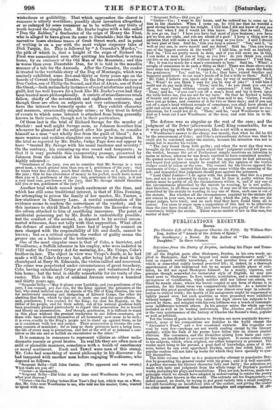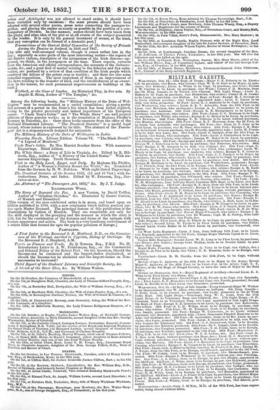PUBLICATIONS RECEIVED.
Booze.
The Cloister Life of the Emperor Charles the Fifth. By William Stir- ling, Author of "Annals of the Artists of Spain."
The Goldbeater ; a Novel. By the Author of "The Blacksmith's Daughter." In three volumes.
Selections from the Poetry of Dryden, including his Plays and Trans- lations.
[Of all the English poets after Shakspere, Dryden, in his own words ap- plied to Shakspere, had "the largest and most comprehensive soul," at least as regards worldly knowledge, or that peculiar form of civilization which is somewhat candy termed practkal life; if, indeed, in a thorough apprehension of this widespread but by no means amiable phase of exis- tence, he did not equal Shakspere himself. In a manly, vigorous, and genuine though somewhat too vernacular style of English, he may also stand next to Shakspere. In flow, variety, modulation, and a certain native springiness of versification, which neither skill nor labour can attain, we think he stands alone, where the heroic couplet or any form of rhyme is in question, for his blank verse was comparatively inferior. As a satirist he possesses this great peculiarity—his anger was almost ever kept in subordi- nation to critical truth ; the merits of his antagonists might be suppressed or lightly passed over, but such qualities as were presented were exhibited without temper. The satirist was raised too high above his subjects to be moved by them, and mingled with his own loftiness was a touch of contempt- uous indifference towards others. In his greater satire the whole age was included as well as its leading individuals. The Abeolom and Achitophel is the very quintessence of the history of Charles the Second's time, popular as well as political.
Yet the verses of poets far inferior to Dryden are more popularly known : indeed, none of his compositions are familiar to the world except the "Alexander's Feast," and a few occasional extracts. His tragedies are read by very few—perhaps are not worth reading except by the literary student; while the bulk of his poems have fallen into an almost similar oblivion. His coarseness, and the blemishes arising from haste and care- lessness are insufficient to account for this neglect. It seems rather owing to his subjects, which, when original, are either temporary or personal. The reader must bring to his perusal a good deal of knowledge, some of it mi- nute, before he can even apprehend Dryden, much less relish him; and popular readers will not take up books for which they have specially to qua- y themselves.
The little volume before us is a praiseworthy attempt to popularize Dry- den by presenting the general reader with his gems ; and it is well executed. A preface discusses his literary character fully, and fairly the selections are made with taste and judgment from the whole range of Dryden's poetical works, including his plays and translations. They are not, however, made on a principle which we should have adopted in endeavouring to render the poetry of Dryden better known to the world. The extracts are too fragmentary,—a defect caused, no doubt, by trying to put great variety into a small compass; but still furnishing an insufficient idea of the author, and giving the reader no other means of interest than isolated thoughts and expressions. If 46- solom and Achitophel was not allowed to stand entire, it should have been curtailed only by omissions : the same process should have been adopted with several other poems, -prose notes connecting the passages to- gether, and placing the reader as nearly as possible in the position of a con- temporary of Dryden. In like manner, scenes should have been taken from the plays, and some idea of the plot or at all events of the subject presented to the reader. It is only by Ins general treatment of scenes, at the least, that any conception can be formed of a dramatic poet.] Transactions 'If the Central Relief Committee of the Society of Friends during the Famine in Ireland, in 1846 and 1847. [An able and well-arranged volume, though it comes rather late in the day especially as some parts of the most interesting matter-the reports of the district visitors, descriptive of the intenseness of the Irish distress-ap- peared, we think, in the newspapers at the time. These reports, extracts from the American and official correspondence, the accounts of the disburse- ments, &c., and a good deal of matter relating to the fisheries and flax culti- vation are prefaced by a review of that condition of the Irish people which rendered the failure of the potato crop so terrible; and there are also some remedial suggestions. The most important of these is an improvement of the laws relating to the transfer of land, and the establishment of an owner- ship in the tenant, for such permanent improvements as buildings at the least.] We Week, or the Siege of Leyden. An Historical Play, in five acts. By Angelo R. Slow, Author of "The Templar," &c.
Among the following books, the "Military History of the Duke of Wel- lington" may be recommended as a useful compilation ; giving a pretty full account of a period in the Duke's life which has been rather slighted, owing to the greater proximity and indeed importance of his European career. "Uncle Tom's Cabin" and "The White Slave" are well printed editions of these popular works; as is the translation of Madame Pfeiffer's Journey in Palestine, &e. : these three books emanate from the office of the National Illustrated Library. "The Practical Statutes" is a useful legal annual, whose nature is expressed by its title. The abstract of the Passen- gers' Act is a sixpennyworth designed for emigrants.
The Military History of the Duke of Wellington in India.
Waverley Novels. Library Edition. Volume VI. "The Black Dwarf." "A Legend of Montrose."
Uncle Tom's Cabin. By Mrs. Harriet Beecher Stowe. With numerous Engravings. Third edition.
The White Slave; a Story of Life in Virginia, &c. Edited by R. Hil- dreth, Esq., Author of "A History of the United States." With nu- merous Engravings. Tenth thousand.
Visit to the Holy Land, Egypt, and Italy. By Madame Ida Pfeiffer, Author of "A Woman's Journey Round the World," &c. Translated from the German by H. W. Dulcken. With eight tinted Engravings.
The Practical Statutes of the Session 1852, (15 and 16 Viet.) with In- troductions, Notes, and Index. Edited by W. Paterson, Esq., Bar- rister-at-law.
An Abstract of "The Passengers Act, 1852," &c. By J. T. Judge. ILLUSTRATED WORK.
The Story of Reynard the Fox. A new 'Version, by David Vedtler, Author of " Orcadian Sketches," &e. Illustrated by Gustav Canton, of Munich and Dasseldorf.
[This version of the once celebrated satire is in prose, and based upon an edition published in 1706, with a new conclusion which inflicts poetical jus- tice upon Master Reynard. The principal feature of this publication is the illustrations by Canton of Munich. They are remarkable not only for the skill displayed in the grouping and the manner in which the story is told, but for the combination of the features and forms of the animals with human appearance and action. The book is a very handsome embodiment of a satiric fable that formed for ages the popular pabulum of Europe.]
Pastriumrs.
A First Letter to the Reverend S. R. Maitland, D.D., on the Genuine- ness of the Writings ascribed to Cyprian, Bishop of Carthage. By the Reverend E. J. Shepherd, A.M.
Tracts on Finance and Trade. By B. Torrena, Esq., F.R.S. No. IL Introductory Letter to A. W. Fonblanque, Esq., on the Commercial and Colonial Policy of Sir Robert Peel. On the Question, Should the Income-tax be continued and the Import-duties diminisbed, or should the Income-tax be abolished and the Import-duties on Non- necessaries be increased ?
Thikl Report of the Students' Literary and Scientffic Society, &c. A Sketch of the River Ebro, &o. By William Walton.



























 Previous page
Previous page